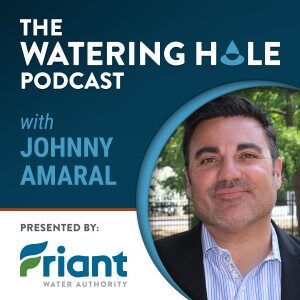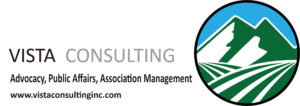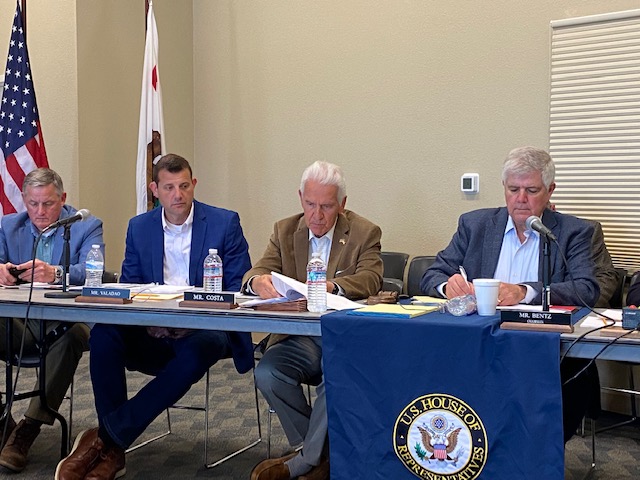After years of one party running congress another party has taken control of the House of Representatives. Two examples of how this has helped San Joaquin and Sacramento Valley agriculture is having the Speaker of the House from Kern County and more congressional hearings. Just twice this year there have been two such hearings at the World Ag Center in Tulare. First, during the World Ag Expo there was a hearing on the quinquennial Farm Bill and again yesterday to gather input on two proposed pieces of legislation; H.R.215 and H.R. 872.
On Tuesday, April 10th about 80 people gathered on a sunny afternoon in Tulare to hear seven congressmen and five out of nine witnesses. The four who didn’t show were the very definition of conspicuous by their absence.
The Players
The hearing was chaired by Congressman Cliff Bentz (R-2nd District of Oregon.) Bentz is the Chair of the Subcommittee on Water, Oceans and Wildlife sometimes known as the WOW but often referred to as the Water Wildlife and Fisheries Subcommittee or the WWF which makes one think of panda bears wrestling and tends to upset certain environmental groups. Bentz has made three or four trips to the Valley in the past year and has a working knowledge of what the circumstances are impacting agriculture and water.
Also present was Congressman Bruce Westerman (R-4th District of Arkansas.) Westerman serves as the Chair of the Natural Resources Committee of which the WWF is a subcommittee. He too has traveled the Valley and has knowledge of the challenges facing farmers and ranchers in California.
The rest of the Congressional delegation was from California, all but Doug LaMalfa (R-1st District) of Northern California represent the San Joaquin Valley. There was David Valadao (R-22nd District) who represents much of Tulare County and is author of H.R. 215 The Water for California Act, Tom McClintock (R-5th District) who represents an eastern portion of the Valley and the western Sierra Nevada, John Duarte (R-13th District) representing the northern portion of the San Joaquin Valley and Jim Costa the lone D from the Valley’s 21st District.
Witnesses
Invited to testify at the hearing were some very involved water management professionals. Jason Phillips CEO of the Friant Water Authority, Christ White CEO of the San Joaquin River Exchange Contractors, William Bourdeau Director Westlands Water District, Jeff Sutton CEO of the Tehama Colusa Canal Authority, Aaron Fukuda GM Tulare Irrigation District and Tony DeGroot Chairman of the Delta View Water Association.
Also invited to testify were representatives from the Governor Gavin Newsom and President Joe Biden administrations. Those invited did not show up or send a representative but instead submitted written testimony in opposition to both of the bills. Martha Williams – Director of the US Fish & Wildlife Service, Dr. Rick Spinrad – Administrator National Oceanic & Atmospheric Administration, Camille Touton – Commissioner of the US Bureau of Reclamation and Charlton Bonham – Director of the California Department of Fish & Wildlife could have all given some reasoning before the public most impacted by their positions. But they didn’t.
The folks gathered in the room to listen were a who’s who of Valley agriculture. Big and small farmers and directors from water and irrigation districts, joint powers authorities and nongovernmental organizations were all there.
The Hearing
Bentz fired things up at about 2:00pm. A local pastor was asked to give an invocation but ended up giving that plea for unity and wisdom and a short sermon based on Romans, 13th chapter, the responsibility of both those in office and the citizens to honor God with their actions. Then a color guard presented our nation’s flag and we all saluted it.
Bentz gave an introduction defining many of the problems faced by those who depend on water in the Western United States and particularly the San Joaquin Valley.
Westerman was asked to speak and he pointed out whenever members of the administration decline to attend hearings a letter is sent to the Appropriations Committee in order to keep track of engagement and cooperation. How about that? Westerman also pointed out the Biden Administration is opposed to changes involving water in the West and no one from the Newsom Administration was willing to attend and openly discuss their opposition to the proposed bills.
A big part of the day’s talk centered around raising Shasta Dam. In fact, Valadao’s H.R. 215 “WATER for California Act” (Working to Advance Tangible and Effective Reforms) builds on the Water Infrastructure Improvements for the Nation (WIIN) Act. I don’t care what you say, the man doesn’t miss a beat with the acronyms. This bill will do many things, a few legalistic insurance policies on water supply and cost – but for the Valley the two things most notable are the raising of Shasta Dam and a return to the 2019 biological opinions.
H.R. 215 extends provisions in the WIIN Act allowing Shasta Dam to be raised, I think a mere 11 feet, creating an additional 634,000 a/f of storage. Storage that can be used to augment the cold water pool for salmon temperatures in the Sacramento River, amongst other useful purposes, like growing food for our national security.
The bill also addressed a particularly shameful bit of political theater when Newsom and Biden sued to prevent the 2019 biological opinions arrived at in a consultation between the state and feds used to update water management in the Delta based modern and rigorous science. This suit was nothing more than a display of blatant, juvenile false bravado against the Trump Administration on political grounds. And it harmed the state’s environment and economy.
H.R. 215 will require the federal government to provide the maximum amount of water practicable to federal Central Valley Project and State Water Project contractors consistent with the 2019 Bi-Ops. And as a bonus for the environment it will require the Secretary of Interior to complete the fish, wildlife and habitat restoration programs required under the Central Valley Project Improvement Act within two years of H.R. 215’s passage. The CVPIA was passed in 1992, it’s about time, isn’t it?
The other bill under discussion was H.R. 872 was authored by Congressman Ken Calvert (R-41st District Southern California) cosponsored by our own Jim Costa and Tom McClintock as well as Darrell Issa, Jay Obernolte, Mike Simpson and Michelle Steele all of California and all but Costa Rs.
H.R. 872, I think it’s been called the Fish Act, but what it lacks in a snappy acronym it makes up for with common sense. That is if you think having only one Cabinet level federal agency manage salmon. As it is right now both the Department of Interior and the Department of Commerce have authority over the Endangered Species Act provisions applicable to salmon.
You know who else thinks this is commons sense? President Barack Obama. Quoting material provided by the House Resources Committee, “In his 2011 State of the Union address, President Barack Obama highlighted this duplicative authority as his “favorite example” of government inefficiency, saying ‘the Interior Department is in charge of salmon while they’re in freshwater, but the Commerce Department handles them when they’re in saltwater. And I hear it gets even more complicated once they’re smoked.’
“Thereafter, President Obama formally proposed the idea of merging NOAA into the Department of the Interior in 2012 in his Fiscal Year (FY) 2013 budget request and echoed the proposal in his FY 2016 budget request.”
H.R. 872 will allow salmon to be managed holistically from birth to spawning, from fresh to ocean to fresh water again. This will also benefit the stalled storage projects like the Sites Reservoir by reducing the myriad of often conflicting permitting hurdles between multiple agencies.
Testify Brothers
Each Congressman was granted five minutes to make an opening statement and each witness was given five minutes to do the same. Then the Congressmen asked the witnesses questions. It was one of the better hearings I’ve attended. There was an almost complete lack of grandstanding and patting oneself on the back with big, self-congratulatory praise. Here are some highlights.
Phillips observed the even with the massive snow and rain the drought in California isn’t over and it won’t be over as long as unaccountable, unelected staff have control of water operations. He said California’s water system is being operated as a failure and the federal agencies need congressional mandates to get the job done. He also said the elected officials need to be held accountable for this.
White said both of the proposed bills will help bring stability. He cited the raising of Shasta helps the Sacramento and San Joaquin Valleys and salmon runs. He called it a win/win. He reminded everyone there is the dam raising at the San Luis Reservoir that will add more storage and the proposed Del Puerto Dam and Los Banos Creek projects can turn flood water into additional storage. Congressman LaMalfa noted the removal of hydroelectric, flood control and storage dams along the Klamath River in Northern California.
Sutton is not only at the helm of the Tehama Colusa Canal but also on the Sites Reservoir Project Board. He said the economy is agriculture since everyone needs to eat. He said the Central Valley Project was designed to provide drought protection for up to five years at a time if operated as originally intended. He noted for the first time in history the Sacramento contractors didn’t get an allocation in 2022. He said the Sites project was first proposed in the 1950s and H.R. 872 Fish Act will help get things rolling faster with the reduced red-tape of having only one federal agency to deal with in regards to endangered species.
Sacramento contractors didn’t get an allocation in 2022. He said the Sites project was first proposed in the 1950s and H.R. 872 Fish Act will help get things rolling faster with the reduced red-tape of having only one federal agency to deal with in regards to endangered species.
Bourdeau stated what was on most folks’ minds – the bills are common sense. He said we have to improve the infrastructure with more storage and improve the regulatory process with better, fact based science. He also expressed concerns about the nation’s food security and the next generation of farmers and ranchers being provided a way to continue.
Fukuda began by quoting Dr. Eddie Ocampo of Self Help Enterprises, “The culture of our region is agriculture.” It’s important to note there was a half dozen or more folks in attendance wearing Self Help Enterprises shirts. It was good to see an NGO that wasn’t a law firm in disguise engaged in the process. Fukuda said the Valley has too much reliance on groundwater because of surface water not being provided causing increased pumping. It’s a self-perpetuating cycle and the feds could help with storage. He spoke about the Seaborne project Tulare ID and others are involved in that will add 8,000 a/f of storage locally. He said supply and regulatory relief are at the top of his concerns.
In addition to being chair of the Delta View Water Association, which is a group of white area growers in the Kaweah Subbasin, DeGroot is a dairy farmer with land located between Visalia and Hanford. He said God has given us a unique opportunity with the knowledge California is provided with amazing water abundance in between dry times. The only sane option is to invest in the future. He has concerns with SGMA’s largely unforeseen treatment of white areas and thinks there should be better integration with GSAs. DeGroot believes the Water Blueprint for the San Joaquin Valley is an important component of improving the Valley’s future. He said recharging flood water is of course good and necessary but it is not enough. He said there will be a shortage of animal feed that will adversely impact the supply chain and cause higher food prices. He also advocated for more canals to move water east to west and back across the Valley.
California is provided with amazing water abundance in between dry times. The only sane option is to invest in the future. He has concerns with SGMA’s largely unforeseen treatment of white areas and thinks there should be better integration with GSAs. DeGroot believes the Water Blueprint for the San Joaquin Valley is an important component of improving the Valley’s future. He said recharging flood water is of course good and necessary but it is not enough. He said there will be a shortage of animal feed that will adversely impact the supply chain and cause higher food prices. He also advocated for more canals to move water east to west and back across the Valley.
Congressional Views
McClintock asked the witnesses some rhetorical questions about their challenges. Phillips said projects like Temperance Flat were killed by regulatory overreach. Sutton said there is an overwhelming need for storage. Bourdeau said streamlining the permitting process could save a lot of water for the environment as well as people. McClintock spoke a bit about the differing views coming from government. He said on side there are those who seek prosperity along with a well balanced use of water and those who seek poverty as it is much easier to give into the power of regulating something out of existence than to help. He said the environmental laws have been a failure.
LaMalfa asked about how to implement projects and Phillips told him congress has to set the projects. Each administration brings a change of attitude but the regulators remain the same. Fukuda cited the arrogance of government. He said High Speed Rail was told repeatedly that building in the Tulare Lake bottom was a bad idea but today its construction is underwater. He said they’ve already spent $20 billion on HSR and there is no end in sight.
Of all the people in the room who put their money where their mouth is I doubt anyone has put more money up than Duarte. You may recall he was emmeshed in a multi-million dollar legal battle against charges he violated wetlands protection growing dryland wheat. Crazy no?
Duarte pointed out California’s gross domestic product is estimated at more than $3 trillion annually. The state needs to invest about $40 billion in water infrastructure – that’s about .013 percent of one year’s GDP. The major metropolitan areas and Sacramento aren’t willing to invest as they are the lords of scarcity when we need champions of abundance. He called Newsom a woke Moses and said to remember the water needs when food prices rise.
willing to invest as they are the lords of scarcity when we need champions of abundance. He called Newsom a woke Moses and said to remember the water needs when food prices rise.
Pointing to the empty seats in the witness section Duarte said Williams from USF&W blocked permits that would have prevented flooding in Planada. Spinrad from NOAA has complicated all things salmon, Touton has yet to reveal a Bureau plan to deal with flooding when the snowmelt hits later this year and Bonham is sitting on permits for the Sites Reservoir.
Costa said food is most definitely a national security issue and the new biological opinions need to be implemented now and infrastructure fixed. In response to questions Phillips said the Water Blueprint for the San Joaquin Valley could use some help with federal funding. White said construction for the Los Banos Creek project can start next year. Bourdeau strongly favors more investments in on farm recharge.
Valadao asked Sutton about the Sites project. Sutton said it was first proposed in the 1950s but it didn’t really start to gain legs until 2010 when the committee was formed to move the project along. Sutton said the biggest problem is permitting for biological and environmental compliance. Bourdeau said at least two-thirds of Westland farmers have to fallow some land due to water availability. He said there are more than a dozen communities on the Valley’s westside that depend on CVP water, the same sources as farmers. Fukuda said Tulare County could account for a quarter of all fallowed land in the state due to water. All agreed the red-tape associated with securing a permit from the Army Corps of Engineers to get permission to clean a stream bed of obstacles causes delays that cause flooding. DeGroot said the Fish & Wildlife permits are a maze that white areas are not able to navigate.
farmers. Fukuda said Tulare County could account for a quarter of all fallowed land in the state due to water. All agreed the red-tape associated with securing a permit from the Army Corps of Engineers to get permission to clean a stream bed of obstacles causes delays that cause flooding. DeGroot said the Fish & Wildlife permits are a maze that white areas are not able to navigate.
Westerman mentioned H.R. 1, a bill written to lessen the red-tape of federal permitting and recommended all those in attendance lend it support. He said he’s learned from his trips here California has enough water but lacks infrastructure improvements and accompanying regulatory relief. He asked what was needed most, infrastructure or operational improvements. Phillips said the last time congress dealt with any operational issues was the Central Valley Project Improvement Act. White said both are in dire need of adjustments as did Sutton. Bourdeau and Fukuda listed operations as most in need of change and DeGroot felt infrastructure is the most pressing issue.
here California has enough water but lacks infrastructure improvements and accompanying regulatory relief. He asked what was needed most, infrastructure or operational improvements. Phillips said the last time congress dealt with any operational issues was the Central Valley Project Improvement Act. White said both are in dire need of adjustments as did Sutton. Bourdeau and Fukuda listed operations as most in need of change and DeGroot felt infrastructure is the most pressing issue.
Bentz said he recently read a Los Angeles Times Op Ed stating more storage is needed in California. He found that surprising to read in the Times and asked how to move public opinion. Phillips said to call out operational waste like the first flush of the Delta rule that sends huge amounts of water out to sea regardless of actual conditions. White said to refresh the vision of California and try to get that to the media. Bourdeau said supporting reporters with information and cited the online San Joaquin Valley Sun as an example of better, balanced reporting. Fukuda said to fund advocacy. DeGroot said he didn’t know how but he’d sure like to see the responsibility for policy put back on the government so elected officials will take into account the regulatory failures.
refresh the vision of California and try to get that to the media. Bourdeau said supporting reporters with information and cited the online San Joaquin Valley Sun as an example of better, balanced reporting. Fukuda said to fund advocacy. DeGroot said he didn’t know how but he’d sure like to see the responsibility for policy put back on the government so elected officials will take into account the regulatory failures.
Valadao was given the last word since this hearing was being conducted in his district. He thanked everyone for attending and pointed out Self Help Enterprise as doers and not just hearers of the word. He said it was good to hold these hearings in the Valley and gather testimony in the field as opposed to forcing everyone to trek to Washington DC.
If you didn’t attend the hearing and found this report too much resembled empty calories go here and watch a video recording of the event.
DISCLAIMER OF RESPONSIBILITY; Waterwrights.net strives to provide its clients with the most complete, up-to-date, and accurate information available. Nevertheless, Waterwrights.net does not serve as a guarantor of the accuracy or completeness of the information provided, and specifically disclaims any and all responsibility for information that is not accurate, up-to-date, or complete. Waterwrights.net’s clients therefore rely on the accuracy, completeness and timeliness of information from Waterwrights.net entirely at their own risk. The opinions expressed in this report are those of the author and do not represent any advertisers or third parties.
ALL RIGHTS RESERVED. Copyright 2023 by WaterWrights.net





























